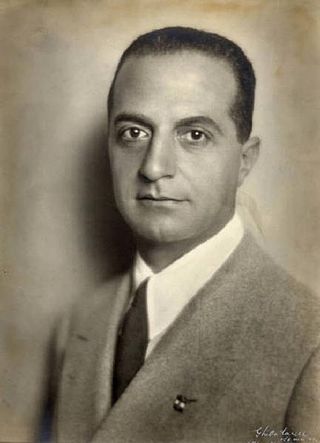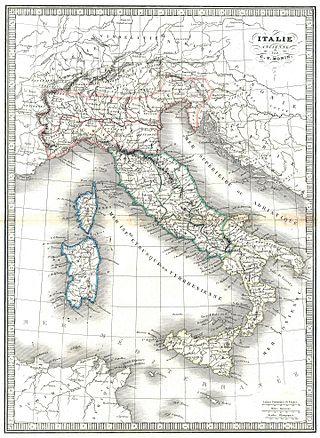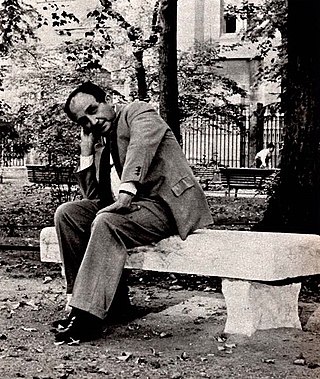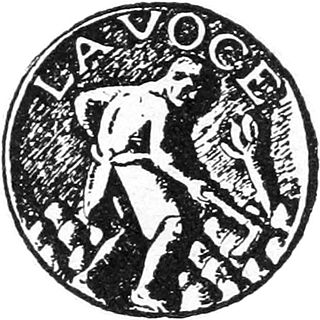Related Research Articles

Federico Fellini was an Italian filmmaker. He is known for his distinctive style, which blends fantasy and baroque images with earthiness. He is recognized as one of the greatest and most influential filmmakers of all time. His films have ranked highly in critical polls such as that of Cahiers du Cinéma and Sight & Sound, which lists his 1963 film 8+1⁄2 as the 10th-greatest film.

Eugenio Montale was an Italian poet, prose writer, editor and translator, and recipient of the 1975 Nobel Prize in Literature.
Clerical fascism is an ideology that combines the political and economic doctrines of fascism with clericalism. The term has been used to describe organizations and movements that combine religious elements with fascism, receive support from religious organizations which espouse sympathy for fascism, or fascist regimes in which clergy play a leading role. It is a Christian form of the more general concept of Theofascism, where religious ideology is combined with Theocracy.

Giuseppe Bottai was an Italian journalist and member of the National Fascist Party of Benito Mussolini.

Italian fascism, also known as classical fascism or simply fascism, is the original fascist ideology as developed in Italy by Giovanni Gentile and Benito Mussolini. The ideology is associated with a series of two political parties led by Benito Mussolini: the National Fascist Party (PNF), which ruled the Kingdom of Italy from 1922 until 1943, and the Republican Fascist Party (PFR) that ruled the Italian Social Republic from 1943 to 1945. Italian fascism is also associated with the post-war Italian Social Movement (MSI) and subsequent Italian neo-fascist movements.

Concentrazione Antifascista Italiana, officially known as Concentrazione d'Azione Antifascista, was an Italian coalition of anti-fascist groups which existed from 1927 to 1934. It was formed in Paris on 27 March 1927 with the purpose of the organization of Italian antifascist forces in order to reorganize the anti-fascist movement abroad avoiding to repeat the old divisions existing in Italy before the establishment of the regime. The CAI made a public appeal signed by Claudio Treves and Giuseppe Emanuele Modigliani (PSLI), Pietro Nenni and Angelica Balabanoff (PSI), Fernando Schiavetti and Mario Pistocchi, Bruno Buozzi and Felice Quaglino (CGdL) and by Alceste De Ambris. Communists remained outside along with liberals, populars and others in order to keep contact with Italian masses "in their social defence and political resistance moves". The official weekly newspaper La Libertà was created on 1 May 1927 with Claudio Treves as director.

Vasco Pratolini was an Italian writer of the 20th century. He was nominated for the Nobel Prize in Literature three times.

Luigi Federzoni was an Italian nationalist and later Fascist politician.

Ettore Ovazza was an Italian Jewish banker. He was an early financer of Benito Mussolini, of whom he was a personal friend, and Italian fascism, which he supported until the Italian racial laws of 1938. He founded the journal La nostra bandiera. Believing that his position would be restored after the war, Ovazza stayed on after the Germans marched into Italy. Together with his wife and children, shortly after the Fall of Fascism and Mussolini's government during World War II, he was executed near the Swiss border by SS troops in 1943.

Giovacchino Forzano was an Italian playwright, librettist, stage and film director. A resourceful writer, he authored numerous popular plays and produced opera librettos for most of the major Italian composers of the early twentieth century, including the librettos for Giacomo Puccini's Suor Angelica and Gianni Schicchi.
"900",Cahiers d'Italie et d'Europe was an Italian magazine published for the first time in November 1926, directed by Massimo Bontempelli with Curzio Malaparte as co-director. Beginning as an internationalist publication, after some numbers it dramatically changed its editorial line, rallying to the nationalist, strapaesani line of the magazine Il Selvaggio.
Corrente di Vita was a biweekly Italian culture magazine published between 1938 and 1940.

Alfonso Gatto was an Italian writer. Along with Giuseppe Ungaretti he is one of the foremost Italian poets of the 20th century and a major exponent of hermetic poetry.

La Voce was an Italian weekly literary magazine which was published in Florence, Italy, between 1908 and 1916. The magazine is also one of the publications which contributed to the cultural basis of the early forms of Fascism. It also contributed to the development of the concept of Europeanism.
Il Frontespizio was an Italian art and literary magazine, which had a Catholic perspective. The magazine existed between 1929 and 1940 and was based in Florence, Italy.
Solaria was a modernist literary magazine published in Florence, Italy, between 1926 and 1936. The title is a reference to the city of sun. The magazine is known for its significant influence on young Italian writers. It was one of the publications which contributed to the development of the concept of Europeanism.

The Kingdom of Italy was governed by the National Fascist Party from 1922 to 1943 with Benito Mussolini as prime minister and dictator. The Italian Fascists imposed totalitarian rule and crushed political and intellectual opposition, while promoting economic modernization, traditional social values and a rapprochement with the Roman Catholic Church.
Il Selvaggio was a political and arts magazine that existed between 1924 and 1943. It was a media outlet of an intellectual group called Strapaese.
Federico Della Valle,, was an Italian baroque dramatist and poet, recognized only in the 20th century as one of the greatest Italian tragedian of the seventeenth century.

Giovanni Antonio Francesco Giorgio Landolfo Colonna Romano (1878–1940) was an Italian noble and politician who was the leader of the Social Democracy. He also served as the minister of post and telegraphs between 1922 and 1924 in the Mussolini Cabinet. He was known as the "anthroposophist duke".
References
- 1 2 3 4 "Vasco Pratolini". Italica Press. Retrieved 17 January 2015.
- 1 2 Emiliana P. Noether (December 1971). "Italian Intellectuals under Fascism". The Journal of Modern History. 43 (4): 646. doi:10.1086/240685. S2CID 144377549.
- ↑ Damien Simonis (2006). Florence . Lonely Planet. p. 35. ISBN 978-1-74059-809-5.
- 1 2 3 Mariana Aguirre (2013). "The return to order in Florence: Il Selvaggio (1924–1943); Il Frontespizio (1929–1940); Pègaso (1929–1933); and Campo di Marte (1938–1939)". In Peter Brooker; Sascha Bru; Andrew Thacker; Christian Weikop (eds.). The Oxford Critical and Cultural History of Modernist Magazines. Oxford: Oxford University Press. pp. 491–510. ISBN 9780199659586.
- 1 2 Peter Bondanella; Julia Conway Bondanella, eds. (2001). Cassell Dictionary Italian Literature. London: A&C Black. p. 470. ISBN 978-0-304-70464-4.
- ↑ "Vasco Pratolini". Encyclopædia Britannica.